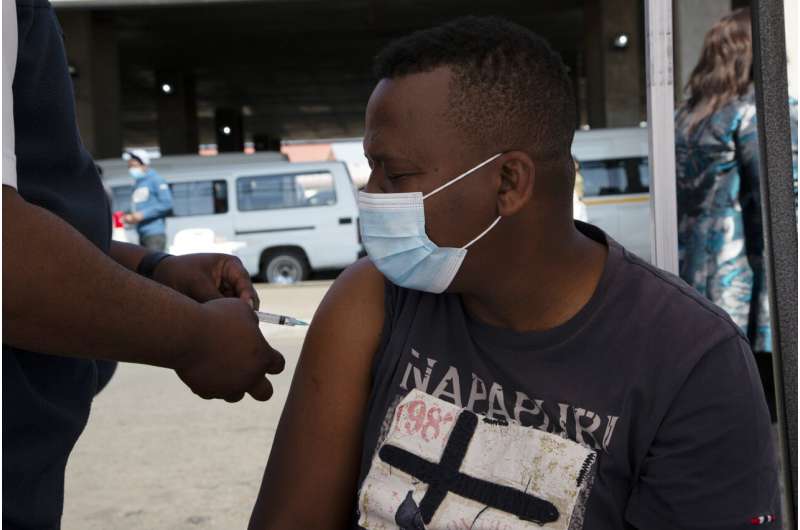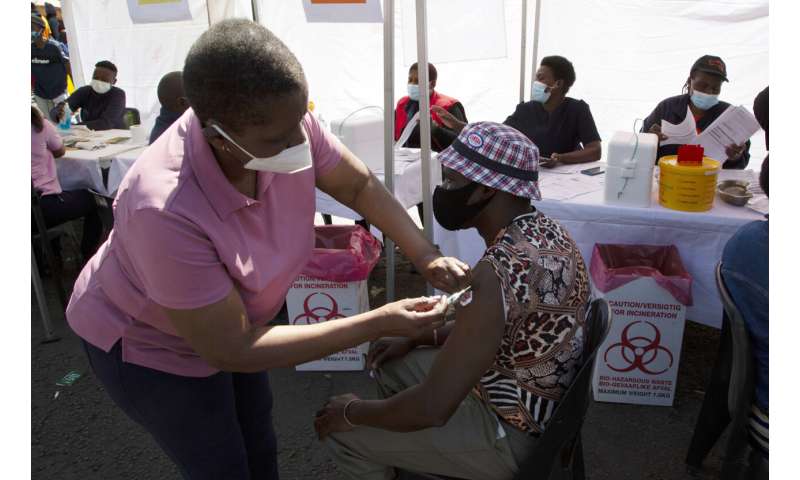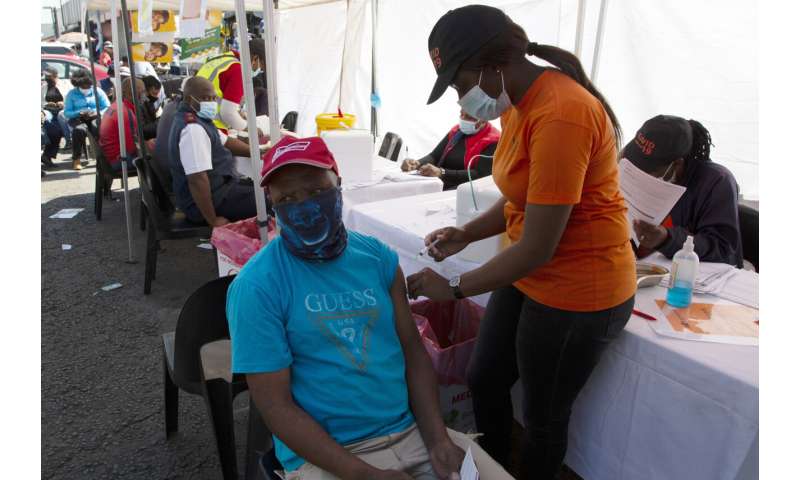To boost vaccinations, South Africa opens jabs to all adults


At the busy taxi stand near Soweto’s Chris Hani Baragwanath hospital, a health worker with a megaphone called out to commuters, calling them to come and get a COVID-19 vaccination.
Olekantse Serati was one of the dozens of people who decided to get jabs on Friday.
“It is a good thing that they’ve brought the vaccines to us here at the Bara taxi rank so we don’t have to go the vaccination centers or hospitals,” said Serati in the Tswana language. “It’s also good that you can receive the jab quick and be on your way home straight after.”
Johnson & Johnson jabs were given so only one dose is needed. The pop-up center is part of South Africa’s efforts to boost the flagging numbers of vaccinations.
“We realized that many people are too busy, they do not have time to go to our vaccine sites, so we brought the vaccine to the people that is the taxi rank,” Zodwa Malamule, the manager of the Soweto clinic, said. “Our main purpose is to reach out to the taxi drivers, the commuters and the hawkers (street sellers) that are found within this area.”
Faced with slowing numbers of people getting COVID-19 vaccinations, South Africa has also opened eligibility to all adults to step up the volume of inoculations as it battles a surge in the disease driven by the delta variant.
The country on Friday started offering shots to everyone aged 18 and older as the volume of shots given per day has stalled even though vaccines are now more widely available.

Less than 200,000 jabs are being given per day, down from 250,000 earlier this month and significantly lower than the target of 300,000 that the government had hoped to achieve by this time.
To boost the flagging numbers health officials decided to offer jabs to the younger adults immediately, rather than waiting until September as had been planned earlier.
The vaccination drive comes as the country is battling a resurgence of COVID-19.
In the last 24 hours, South Africa has recorded more than 13,000 new COVID-19 infections, including 317 deaths. Nearly 80,000 people in South Africa have died from the disease in the pandemic, according to official figures, but the actual number of deaths from COVID-19 is estimated to be nearly three times that amount, according to statistics showing the country’s average death rates.
South Africa has by far the largest burden of COVID-19 in Africa. Its 2.6 million confirmed cases of the disease is about 35% of the 7.4 million reported by all Africa’s 54 countries, even though South Africa’s 60 million people make up just 4.6% of the continent’s 1.3 billion people.
South Africa has so far vaccinated more than 10 million people, of which more than 4.6 million are fully vaccinated, either by the one dose Johnson & Johnson vaccine or with two doses of the Pfizer-BioNTech. It aims to inoculate 40 million people by February 2022.
After being hindered by a shortage of vaccines, South Africa now has an adequate supply, mostly from doses it has purchased itself and helped by a donation by the U.S. of nearly 6 million Pfizer-BioNTech doses.

Several vaccination sites have been inviting people to come and get vaccinated as many have recently experienced low volumes despite having enough vaccines.
Pop-up vaccination sites have also been opened to take the jabs to popular gathering spots.
While the government has partly attributed the reluctance to vaccinate on misinformation about vaccines, a new study has indicated that vaccine acceptance among South Africans has increased.
According to the study, conducted by the University of Johannesburg and the Human Science Research Council between June and July this year, 72% of adults accept that vaccines are good to get.
At the pop-up inoculation center in Soweto, Nomvelo Hadebe, took advantage of vaccinations now being offered to people 18 and older. She said she had wanted to get a shot earlier but was not eligible because inoculations were limited to people 35 and older. As soon as South Africa opened eligibility to everyone 18 years and older, she wasted no time.
Source: Read Full Article




